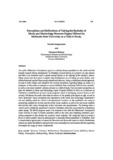Please use this identifier to cite or link to this item:
https://cris.library.msu.ac.zw//handle/11408/1831Full metadata record
| DC Field | Value | Language |
|---|---|---|
| dc.contributor.author | Maguraushe, Wonder | - |
| dc.contributor.author | Matiure, Perminus | - |
| dc.date.accessioned | 2016-10-07T09:15:59Z | - |
| dc.date.available | 2016-10-07T09:15:59Z | - |
| dc.date.issued | 2015 | - |
| dc.identifier.issn | 1815-9036 | - |
| dc.identifier.uri | http://hdl.handle.net/11408/1831 | - |
| dc.description.abstract | One of the Millennium Development goals is to develop literate populations in the world, and this includes musical literacy development. In Zimbabwe musical literacy is a preserve of a few citizens and there is an imminent need to spread musical literacy to the majority of the country’s citizens. Many reasons have been given to explain why Zimbabweans are not taking up music studies, some of them historical, and yet others purely colonial and ludicrous. Using a critical post-colonial approach, we seek to both critique and transform the current perceptions regarding taking up music as a profession. In this article we attempt to uncover Midlands State University (MSU) music students’, as well as non-music students’ opinions of music as a field of study. From an insider perspective, we place the Bachelor of Music and Musicology Degree Program (BMM) at MSU in a continuum of Zimbabwe’s establishment of music study programs aimed at developing musical literacy in the country. We discuss the public views that we observe on the quality of the degree on offer, as well as MSU authorities’ views, perceptions and expectations of the Music and Musicology Department’s role and viability, which are critical to the department’s existence. In this qualitative case study we purposively sampled ten current, and ten former music students, as well as ten non-music students and solicited their views through face to face interviews and questionnaire. The findings show a critical need to rethink the department’s brand in Zimbabwe where the music industry is developing rather slowly. The BMM program needs to be reviewed in line with the Millennium Development Goals (MDGs) in order to remain attractive, while at the same time preparing competent, pacesetting graduates to help develop the country’s music industry. The study also aims to provide a forum to reform people’s views by advocating for a musically literate population in Zimbabwe. Such a transformative agenda aims to expand the discursive and democratic spaces in which Zimbabwean citizens can realise the ability to read and write music, ironically in an environment that has negatively stereotyped the image of music professionals. | en_US |
| dc.language.iso | en | en_US |
| dc.publisher | Midlands State University | en_US |
| dc.relation.ispartofseries | The Dyke;Vol. 9, No. 1; p.134-151 | - |
| dc.subject | Musical Literacy, Millennium Development Goals (MDGs), Music Study, Perception, Rebranding, Music Industry | en_US |
| dc.title | Perceptions and reflections of taking the bachelor of music and musicology honours degree offered by Midlands State University as a field of study. | en_US |
| dc.type | Article | en_US |
| item.grantfulltext | open | - |
| item.languageiso639-1 | en | - |
| item.cerifentitytype | Publications | - |
| item.fulltext | With Fulltext | - |
| item.openairecristype | http://purl.org/coar/resource_type/c_18cf | - |
| item.openairetype | Article | - |
| Appears in Collections: | Research Papers | |
Page view(s)
134
checked on Dec 19, 2025
Download(s)
138
checked on Dec 19, 2025
Google ScholarTM
Check
Items in MSUIR are protected by copyright, with all rights reserved, unless otherwise indicated.




